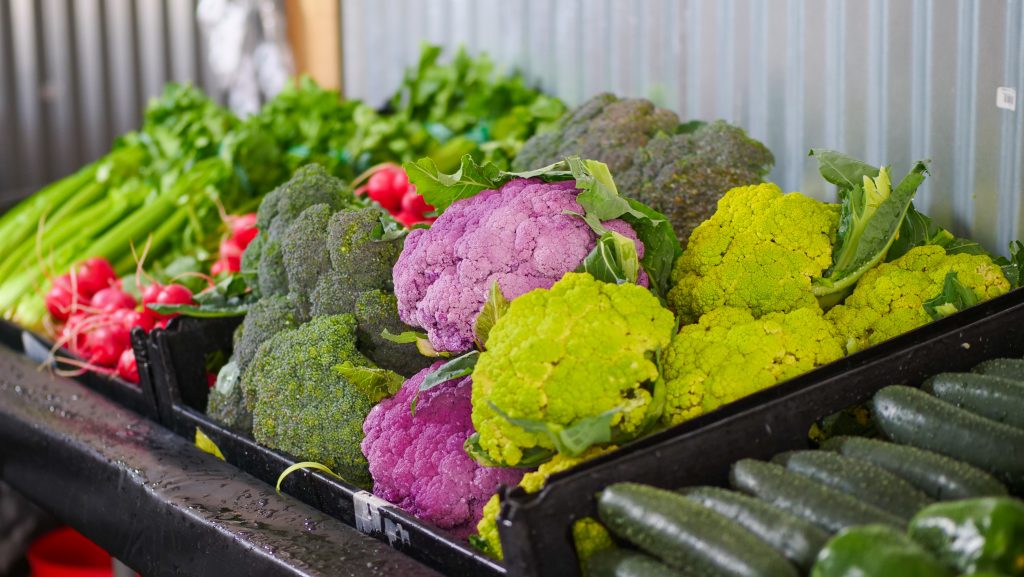Fueling the Body with a Healthy, Balanced Diet
| By Erica Marriaga, MSW, LCSW

Have you ever thought about there being a connection between the foods that we eat and the way that we feel? After eating a pizza pie with extra cheese versus a salad with tons of leafy greens, beans, and protein, do you notice any difference in the way your mind and body feel?
Observe how certain foods affect your mood, both positively and negatively.
Positive Examples:
Protein helps to offer the body a steady energy that allows you to stay active and strong, physically and mentally. Protein including lean meats and poultry, beans, nuts, fish, and eggs.
The Cleveland Clinic notes that “Protein consumption (from foods like fish, beef, chicken, turkey, tofu, beans, eggs, and unsweetened yogurt) has been linked to higher levels of dopamine and norepinephrine, which are brain chemicals that play a role in your mood, motivation, and concentration.”
Fruits and vegetables are high in vitamins, minerals and antioxidants that nourish your body and have also been shown to boost happiness. Fruits and vegetables provide energy, boost your health, and give you a sweet or crunchy treat without zapping your energy or making you feel guilty
Negative Examples:
Soda and sugar snacks might make you feel tired and irritable.
Heavy, fatty foods might make you feel sluggish.
Caffeine might make you feel jittery and interfere with sleep
Are you eating too much or too little to feel the benefits of your diet?
Do you notice that your stomach is growling or you are famished and bloated after you eat? The quantity of food is important. Measuring food on a food scale to ensure you have the correct portion can be beneficial when you are first increasing your awareness of portion control and how much food your body needs.

Staying hydrated by drinking lots of water is important in helping to determine if you are hungry. Experts recommend about 15.5 cups (3.7 liters) of fluids a day for men and around 11.5 cups (2.7 liters) of fluids a day for women. While water is not a replacement for adequate nutrition, it is an important variable in this equation!
Start Small
Here are just a few ways you could start adjusting your diet to help your body feel its best:
- Cut down on processed foods
- Add more fresh foods
- Add an additional amount of fruits and vegetables to meals or have them as a snack
- Add fruit to cereal.
Here are some of the nutrients most notably linked with mental health, as well as a few foods they’re found in
- Omega-3 fatty acids: walnuts, chia and flax seeds, salmon, herring, sardines
- Research shows that increasing essential fatty acids have an effect on the prevention and treatment of anxiety and depression. Additionally, Omega-3 can optimize mood stability & cognitive function.
- Magnesium: spinach, pumpkin and chia seeds, soy milk, black beans, almonds, cashews, peanuts
- Acts as the gatekeeper for NMDA receptors, which are involved in healthy brain development
- Zinc: oysters, chicken, pork chops, beef roast, Alaska king crab, lobster, pumpkin seeds
- Maintains integrity of DNA that helps the brain direct all cellular activities
- B vitamins: chicken breast, beef liver, clams, tuna, salmon, chickpeas, potatoes, bananas
- Produce energy needed to develop new brain cells. Critical brain nutrient that is needed for production of serotonin (mood stabilizer chemical), and may prevent the loss of neurons.
- Vitamin C: red and green peppers, orange and grapefruit juice, strawberries, broccoli
- Crucial to cognitive performance. Helps the maturation of neurons and the formation of the myelin sheath that protects neurons and speeds impulse transmissions.
Reach Out to a Counselor to Help
As always, if you find yourself struggling, do not hesitate to reach out for help. A licensed therapist or counselor can help empower you to be your best self!
Erica Marriaga is a proud fur-mama of her one-eyed rescue dog, Toby, and her puppy, Tucker. She loves to spend time with her son, husband, and bond with her family, nieces, and nephews. Erica is passionate and enthusiastic about her role as a therapist. EWC has locations in Manalapan and Shrewsbury, NJ, and accepts a variety of insurances.
Check out Erica’s professional bio here!
Email Us: info@exceptionalwellnesscounseling.com
Call Now: (908) 415-2042
NEXT STEPS & RESOURCES
- Are you ready to take your first step? Reach out to us.
- Do you feel you may benefit from counseling during this time? Take the first step.
- Interested in online counseling? Learn more
- Interested in group counseling? Learn More
- Resources

